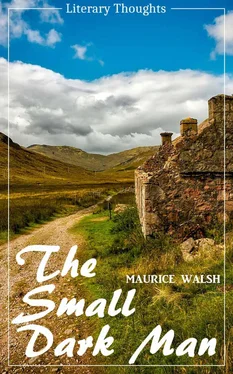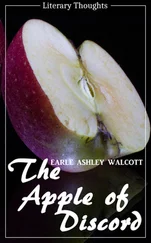“Wrong you are,” said the postmaster. “That first ridge is a snare. It drops into a valley of bare stones—flat slabs cheek by jowl with wee pools scooped out—and you’ll find yourself brought up by a two-hundred-foot wall. A waste of time and shoe leather.”
“Is that the top of the mountain up there?”
“The first cairn. Three of them there are in a mile triangle, and the farthest one away is the highest—the one you’ll be aiming for if your mind is set on going that road to Innismore.”
“It is.”
They were silent then, and the old postmaster leant a shoulder against the jamb and admired the mountain that he had been admiring for half a century. “A grand hill,” he whispered.
A musing baritone murmur reached his ears. “I wonder why Cairn an Cludaigh Bhain wraps itself in a white mantle of a summer afternoon?”
“I’ve heard it explained. The forehill of the range—the warm breeze off the Firth strikes the cold front of it——”
“Any damn fool can give the scientific reason.” Hugh Forbes stopped him. “Would you be knowing the real reason?”
“The real reason?”
“Yes, then. What the gods or devils or little people of the hills play at behind their white mantle?”
“We don’t be heeding them old tales any longer,” said the postmaster a little uncomfortably.
“I thought there would be old tales.”
“If you are going that road,” said the Highlandman quickly, “I will just give you the advice yon other two didna bide to hear.”
“Well, oh well!” shrugged Hugh Forbes. “What the Highlandman has visioned the Irishman might see. Give me your wine of advice, wise man.”
“It is worth notice. If you get up to the cairn—and you will—don’t delay there. You’ll be sore tempted, with half the broad of Scotland under your eye; but just take ae look, and four long breaths that you’ll need, and hurry your road. If the mist comes down on you at the cairn, sit on a stone and wait; and if a mist smothers you across the flat, stick your ash-plant in the peat—mostly peat under a powder of granite—and if you have time, put up a stone ten feet away on the line you are going and keep your feet between the stone and the stick. Something calls you to move and, if you wander, the mist—” He paused and went on—“the mist will hang about you. Bide your place and the mist will move off before the wind in half an hour or less and you’ll have a clear bit—but no’ for lang. Go then as if claymores drove you. And ae thing above all—don’t you attempt the descent unless you see your road. The first of it looks easy and it is that, but Glen Dhu drops a thousand feet as sudden as the edge of the counter there. Ae step over that——”
“It would be the devil of a long step,” said Hugh Forbes. “Is there a road down there?”
“Every here and there the snow water has bit a channel down the cliff, and any of them makes a fine ladder—no trouble there and you with a steady head. Down below by Loch Dhu—black it is, I tell you—you’ll have to watch your step. It’s level there and thick with old heather, but the heather hides hummocks of stone that are aye ready to twist an ankle. Haste ye, but cannily, for it’s a chancy place and night comin’ on, as it will be by then. At the foot of the loch where the Abhain Ban leaves it you’ll come on a path—a track Laird Grant made for the ponies—and, your feet on that, you’ll have only walking before you. Ay, walking! the river down below and the brae at your shoulder and the track white in front of you mile after mile—sixteen o’ them, and no’ a house the whole way except an empty bothy half-roads that they use for the stalking. You have it now, Mr Forbes!”
The small dark man had listened with attention, his eye flickering in visualisation. “I have indeed. No blame to you if I fail to strike Innismore.”
“By the light of the moon you’ll strike it. Have you a piece with you?”
“A piece! Ah! you mean provender. No, then—but suppose you give me four ounces of Bendigo plug.”
The two grinned together, and the postmaster turned back into his shop. “Tam o’ Shanter I keep,” he explained, reaching for a flat yellow tin. “I smoke it myself, and I’ll warrant it to stave off the hunger.”
“No harm to give the hunger something else to bite on. What have you?”
“A bit tin o’ meat?”
“Not ever. I read Upton Sinclair’s Jungle, and after that lived for three years on bully-beef. Oh cripes!”
“A skelb o’ cheese?”
“The kind that stays put.”
“And Abernethy biscuits—the best made.”
“So my wife would say.”
The postmaster was surprised, but the glance under his eyebrows scarcely showed it. “Man,” he said easily, “I would never take you to be married.”
“Neither I am. But my wife is going to be Highland as well as red-haired—when I find her—and ’tis the thing she’d say.”
“Ay indeed! The red-haired ones are hard to come by—but you might be lucky as you are.”
“You may well say it,” agreed Hugh Forbes.
He packed one of the side pockets of the old burberry with biscuits and cheese and reached a brown square hand to the postmaster.
“Good-bye now,” he said. “You have been the best man on the road this side of Glounagrianaan, and there are no better men there. The next time I come your way we’ll talk together.”
“Ay, will we.”
The postmaster stood at the door and watched Hugh Forbes depart, and, when he was gone ten yards, gave him the supreme Scots valediction: the final salute, that is never given except where liking is.
“Haste ye back.”
“To be sure,” called Hugh Forbes, and swung into his stride.
A small dark man was he, but well put together, his shoulders moving in a forward thrust, and his legs, that were slightly bowed, swinging from the hips.
O’er mountain walls
Your road lies steep.
Down dim dark glens
That road you keep.
No fear or foe your road may bar—
But Fate has lit a yellow star.
I
Down the white road marched Hugh Forbes, the swift Croghanmoyle singing on one hand with the birch trees leaning down to listen, and, on the other, a brown moor rolling up to the horizon. Sturdily he went and fast—and yet he gave the curious impression of being unbeholden to time, space, or goal. At the high-cocked bridge, a mile down the road, he leant over the ancient stone parapet and looked down into the river, here feet deep in a still pool and showing every pebble in its green-grey bed. A ten-inch speckled trout seemed to soar fin still half-way down, but, the moment after the dark head appeared, it darted, too quick for eye, under the blackness of a ledge.
“Clear water of the Croghanmoyle,” he murmured sonorously, “I give you best. The hills that ring Glounagrianaan are hills of my heart, but the waters that slide down the wide aprons are the sad brown of peat. Well, one can’t have everything, even in Glounagrianaan.
Sad I was and sore I was,
And lonely to the bone.
Grey o’ grass and green o’ grass
And water over stone,
Set a dream upon a dream
And washed away the lone.”
The bass drone of his singing seemed to vibrate in the grey stone of the bridge. And for long after the song was done he leant on the parapet in some quiet apathy of thought—or no-thought.
The road beyond the Croghanmoyle swerved in towards the foot of Cairn Ban, and the armies of drooping birches flanked it closely. In time he came to that nice but traitorous path winding enticingly upwards among the trees and bracken, and halted at the mouth of it. “The wayward devil you are, Hugh Forbes!” he addressed himself frowningly. “I know you. You hate trailing after that blonde lad and his blonde woman. In spite of anything I can do you’ll set foot on this path and break your damn neck. You will? Go and have a look, then.”
Читать дальше












